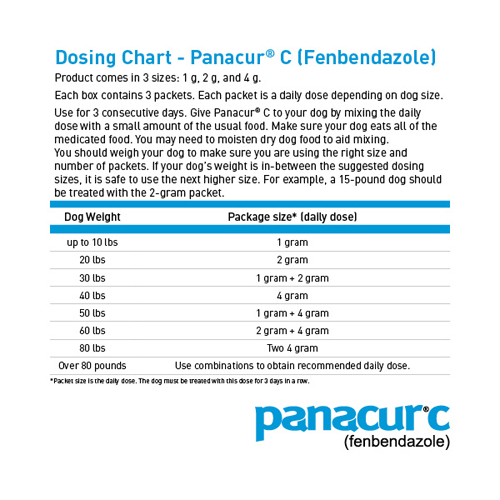Panacur C Canine Dewormer
Save $0 by joining PetPlus
Save $0 by joining PetPlus


Panacur C (fenbendazole) is a broad spectrum parasiticide used to treat hookworms, roundworms, tapeworms, and whipworms in dogs. It is also used by veterinarians to treat other parasites.
NOTE:For heartworm protection, try Ivermectin Pyrantel - Generic to Heartgard Plus.
Dog
Fenbendazole is a member of the benzimidazole group of anti-parasite medications which makes it a relatively broad-spectrum medication. It binds to parasitic proteins which leads to damaging the integrity and the transport function of cells in parasites.
Side effects are rare, but may include loose stools. Since humans can contract roundworms, hookworms, and tapeworms from pets, it's important to maintain good personal hygiene. It's also important to eliminate fleas and to not feed your pet uncooked meat or fish. To prevent re-infection, clean up stools on a daily basis.
Panacur C (Intervet)
Fenbendazole (fen-ben'-da-zole)
Fenbendazole is an anthelminthic (dewormer) used in the treatment of certain types of roundworm, hookworm, whipworm and tapeworm infections in dogs.
Fenbendazole is FDA approved for use in dogs only. The usual dose for dogs, based on weight using the chart below, is given once a day for 3 consecutive days. The medication can be mixed with a small amount of your pet's usual food. Dry dog food may require slight moistening to allow for proper mixing. Medicated food must be fully consumed to be effective.

Side effects of fenbendazole are rare but may include loose stools.
This medication should not be used in animals allergic to it. Because humans can contract roundworm, hookworm and tapeworm from pets, it is important to maintain good personal hygiene. It is also important to eliminate fleas on the pet and in the household and to not feed the pet rodents or uncooked meat or fish. To prevent reinfection, daily cleanup of stools is recommended.
Contact your veterinarian or veterinary emergency room.
Store this medication at controlled room temperature (59-86F).


The medication can be mixed with a small amount of your pet's usual food. Dry dog food may require slight moistening to allow for proper mixing. Medicated food must be completely eaten for the medication to be effective.
| Weight | Dosage |
|---|---|
| 0-10 lbs | Give a 1-gram packet (or 1 gram from jar) daily for 3 days in a row |
| 11-20 lbs | Give a 2-gram packet (or 2 grams from jar) daily for 3 days in a row |
| 21-30 lbs | Give a 1-gram packet and a 2-gram packet (or 3 grams from jar) daily for 3 days in a row |
| 31-40 lbs | Give a 4-gram packet (or 4 grams from jar) daily for 3 days in a row |
| 41-50 lbs | Give a 1-gram packet and a 4-gram packet (or 5 grams from jar) daily for 3 days in a row |
| 51-60 lbs | Give a 2-gram packet and a 4-gram packet (or 6 grams from jar) daily for 3 days in a row |
| 61-80 lbs | Give two 4-gram packets (or 8 grams from jar) daily for 3 days in a row |
| Over 80 lbs | Use combinations to obtain the recommended daily dose. Treat your dog for 3 days in a row |
| Cats | Do not use! |
|---|
| Horses | Do not use! |
|---|
Store this medication at controlled room temperature (59-86°F).


| Active Ingredients | Amount |
|---|---|
| Fenbendazole Granules | 22.2% (222 mg/g) |
| Active Ingredients | Amount |
|---|---|
| Fenbendazole Granules | 22.2% (222 mg/g) |
| Active Ingredients | Amount |
|---|---|
| Fenbendazole Granules | 22.2% (222 mg/g) |
| Active Ingredients | Amount |
|---|---|
| Fenbendazole Granules | 22.2% (222 mg/g) |


 Swipe
Swipe
 Swipe
Swipe

25% off coupon | Up to 40% off sitewide